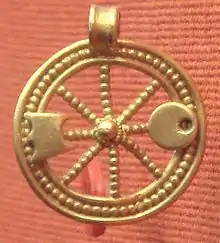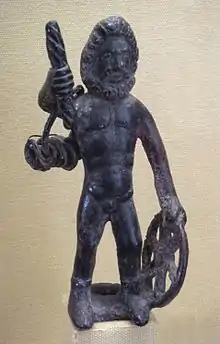Alaunus
Alaunus or Alaunius (Gaulish: Alaunos) is a Gaulish god of healing and prophecy. His name is known from inscriptions found in Lurs, Alpes-de-Haute-Provence in southern France[1] and in Mannheim in western Germany. In the latter inscription, Alaunus is used as an epithet of Mercury.[2] The feminine form Alauna (from an earlier *Alamnā) is at the origin of many place-names and hydronyms across Europe,[3] including the Roman-era names of Valognes in Normandy, Maryport and Watercrook in Cumbria, Alcester in Warwickshire, Ardoch in Perthshire, and Learchild and the River Aln in Northumberland.
Name
The Gaulish theonym Alaunos stems from a Proto-Celtic form reconstructed as *Alamnos. The etymology remains uncertain. It has been traditionally derived from the root *al- ('feed, raise, nurture'), and compared with the Latin alumnus ('nursling') and with names of rivers such as Almus in Moesia, Yealm (*Almii) in England, or Alme in Westphalia. *Alamnos could thus be translated as 'the Nourishing One'.[3][4]
A people named Alauni (Αλαυνοί) is also attested in Noricum, and linguist Xavier Delamarre has argued that the root alǝ-, meaning 'to wander', "would suit river names as much as ethnic ones". In this view, *Alamnos may be compared with the Celtic root *alamo- ('herd'; cf. Old Irish alam, Welsh alaf), and the ethnonym Alauni rendered as the 'errants' or the 'nomads', contrasting with the Anauni ('the Staying Ones').[3] Alternatively, W. F. H. Nicolaisen connected the various hydronyms to the unrelated Proto-Indo-European root reconstructed as *el- or *ol- meaning 'to flow or stream'.[5] P. Monaghan posits an unrelated Celtic river goddess Alauna, found in Brittany.[6]
References
- Where it appears in Greek in the dative case: Αλανειουι, Alaneioui.
- L'Arbre Celtique. "Alaunus" and "Alaunius".
- Delamarre 2003, p. 37.
- Matasović 2009, p. 30: "The Gaul. toponym Alaunos and hydronym Alauna are usually derived from the same root, but like most etymologies of toponomastic elements, this is also uncertain."
- Nicolaisen, W.F.H. Scottish Place-names: Their Study and Significance, pp. 186 ff. Anova Books (Batsford), 1976. Reprinted 1986. ISBN 978-0-7134-5234-1.
- Monaghan, P. The Encyclopedia of Celtic Mythology and Folklore, p. 13. Facts on File (New York), 2002.
- Bibliography
- Delamarre, Xavier (2003). Dictionnaire de la langue gauloise: Une approche linguistique du vieux-celtique continental. Errance. ISBN 9782877723695.
- Matasović, Ranko (2009). Etymological Dictionary of Proto-Celtic. Brill. ISBN 9789004173361.


